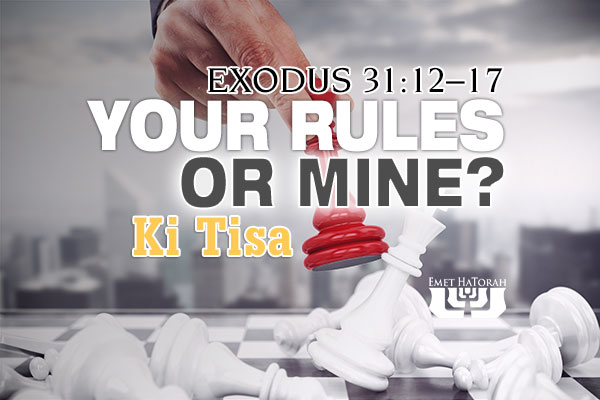Parashat Ki Tisa - Exodus 30:11-34:35
Series:

Your Rules or Mine?
For the last few Torah portions we have been reading and learning about the construction of the Tabernacle and everything that needed to be done for it to function properly. Over the last several chapters Hashem has been dictating to Moses the exact instructions for the Tabernacle and its furnishings, as well as the garments for the kohanim (priests). This week’s parashah concludes these instructions. However, immediately upon giving the last instruction regarding who was to be in charge of all of the craftsmanship, Hashem gives the Children of Israel a stern and detailed warning that none of these things were to be done on Shabbat:
Speak to the Israelite people and say: Nevertheless, you must keep My sabbaths, for this is a sign between Me and you throughout the ages, that you may know that I the LORD have consecrated you. You shall keep the sabbath, for it is holy for you. He who profanes it shall be put to death: whoever does work on it, that person shall be cut off from among his kin. Six days may work be done, but on the seventh day there shall be a sabbath of complete rest, holy to the LORD; whoever does work on the sabbath day shall be put to death. The Israelite people shall keep the sabbath, observing the sabbath throughout the ages as a covenant for all time: it shall be a sign for all time between Me and the people of Israel. For in six days the LORD made heaven and earth, and on the seventh day He ceased from work and was refreshed. (Exodus 31:12–17)
This admonition is the first time we learn of the severe consequences of breaking the Sabbath. Willful transgression of the Sabbath day while living within a theocratic, Torah-based community results in the death penalty.
But what constitutes a Sabbath violation? If violating the Sabbath will result in the dire consequence of the death penalty, then surely the parameters of violating the Sabbath are clearly spelled out in the Torah, right? However, a thorough examination of the entire Torah will not be able to produce any kind of list defining the parameters of what it means to “profane the sabbath,” outside of two instances. The first is to not kindle a fire (Exodus 35:3), and the second has something to do with gathering sticks (Numbers 15:32–36). But even these are far from being explicit. For example, what constitutes kindling? Is it how the fire is initially created, or does it have something to do with adding fuel to an existing flame? And what is this business about gathering sticks? What’s so wrong with this, and why did a man have to lose his life over it?
Because the consequence of this offense was so serious and the guidelines in the Torah are so ambiguous, Israel had to have a clear means by which capital cases that involved Sabbath violations could be adjudicated. There had to be a clear legal definition of what it meant to either keep the Sabbath or break the Sabbath. Therefore, since this passage is the first mention of the death penalty in relationship to the Sabbath, the judges of Israel determined to use this passage as the precedent for determining the boundaries of the Sabbath. Since Hashem gave the explicit command to not engage in these activities on the Sabbath, even for the construction of the Tabernacle, the various labors that were needed to build the Tabernacle and its furnishings were used as the guidelines for determining what must not be done on the Sabbath. Therefore a total of thirty-nine categories of prohibitions became the legally defined boundaries of what it means to desecrate the Sabbath, and are recorded for us in the Mishnah (the codification of Jewish law).
Sometimes it’s very tempting to define what the Torah means on our own terms. But whose definition is binding? Do we play by your rules or mine? We must always remember that the Torah was given to a nation, and not to individuals. While we may have our own interpretations, we do not have any legal authority to say our interpretation is binding. Only the judges of Israel have that authority, and the parameters for how Sabbath must be guarded was established a very long time ago by that authority.








